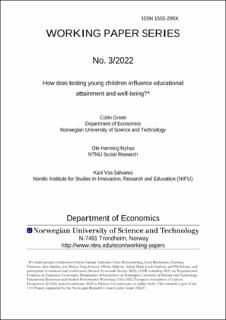How does testing young children influence educational attainment and well-being?
Journal article
Draft

Åpne
Permanent lenke
https://hdl.handle.net/11250/3026288Utgivelsesdato
2022Metadata
Vis full innførselSamlinger
Sammendrag
How much young children should be tested and graded is a highly contentious issue in education policy. Opponents consider it detrimental to child mental health, leading to misaligned incentives in educational policy and having little if any redeeming impact on educational performance. Others see early testing of children as a necessary instrument for identifying early underachievement and educational targeting while incentivising schools to improve the educational performance of children. In practice, there is large crosscountry variation in testing regimes. We exploit random variation in test-taking in mathematics among early primary school children in Norway, a low testing environment. We examine two forms of testing, complex but low-stakes mathematics tests and relatively easy screening tests aimed at identifying children in need of educational assistance. In general, we demonstrate zero effects of testing exposure on later test score performance but some benefits for screening tests on low-performing students. While we demonstrate no negative effects on student welfare, we do find an indication that testing improves aspects of teaching practices and students’ perceptions of teacher feedback and engagement.